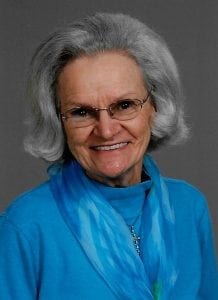Much has been said about the way in which social media is affecting society today. Recently, many of the remarks have been negative. Yes, it has been used by some people in an unhelpful and even harmful way. However, I’ve been able to witness one of the most beneficial aspects of social media on the internet. I’m delighted that rare disease families have been able to connect with others who have the same conditions as they have.
Back in 1967, when my oldest daughter, Kelley, first had physical problems, the doctors we saw thought she needed to be in traction in order to help realign her hips. At first, they said that it would be for a short time, but then she was sent home from the hospital to spend 23 hours a day in traction for at least a month’s time. There was no internet for me to access in order to request suggestions for keeping the active mind of my 4-year-old from becoming bored. However, there was a newspaper that carried a column called “Confidential Chat.” Actually, a form of social media was covered by that newspaper since 1884, when it ran the column known at first as “Housekeepers Column” and then as “Confidential Chat” in 1922. You see, social media is not really something new after all!
A reader of “Confidential Chat” could mail in a question that would be published in that column. The answers that people submitted would show up a couple of weeks later. I did receive some helpful suggestions, as well as some encouraging words from others who wrote into the paper. Those suggestions proved to be very valuable, as that ‘short time’ Kelley was in traction lasted for a total of 9 months. Then we switched doctors and found a better way to treat the whole child!
In 1973, when Kelley was 10-years-old, we finally received the correct diagnosis of her condition, Mucolipidosis type 3. Little was known about that ML3 at that time. There was only one short paragraph about it in the medical literature and only a very few cases were known worldwide.
We had no way to connect with others with her rare disease. The doctors couldn’t legally give us the names of other families they were aware of. In fact, it would be many years later – 1990 to be exact – when we learned about, and subsequently joined the MPS Society. The people we met then didn’t have exactly the same condition as Kelley, but the resemblances were close enough. We had to wait until 2002 to actually meet another family who shared the same diagnosis. At first, our correspondence with them was only through emails. It would still be a number of years before we met up on with many others online.
After all of those years of isolation, I now have a wonderful way to communicate daily (no waiting weeks for responses) with people from around the world who have the same condition my daughter had, as well as many others who have rare diseases. We can share experiences, provide each other comfort, give each other suggestions and offer pep-talks if required.
When I hear others say they are taking a break from Facebook, I assume they are not able to see the beneficial ways in which rare disease families are able to connect on social media. While I do discriminate as to which pages I visit or follow there, taking a break is not what I’ll be doing, and when I see something I don’t agree with, I’ll just keep scrolling.







